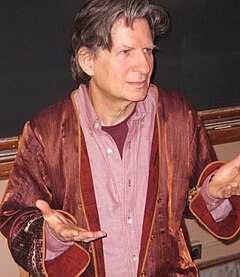
Back مارك ساتين Arabic Mark Satin Spanish मार्क सैटिन Hindi Mark Satin Malay Mark Satin Portuguese Марк Сатін Ukrainian Mark Satin Vietnamese
Mark Satin | |
|---|---|
 Satin talking about "life and political ideologies" in 2011 | |
| Born | Mark Ivor Satin November 16, 1946 |
| Nationality | American |
| Education | University of British Columbia (BA) New York University (JD) |
| Occupation(s) | Political theorist Writer Newsletter publisher |
| Years active | 1967–present |
| Notable work | Radical Middle New Age Politics Manual for Draft-Age Immigrants to Canada |
| Website | www |
Mark Ivor Satin (born November 16, 1946) is an American political theorist, writer, and newsletter publisher. He is best known for contributing to the development and dissemination of three political perspectives – neopacifism in the 1960s, New Age politics in the 1970s and 1980s, and radical centrism in the 1990s and 2000s. Satin's work is sometimes seen as building toward a new political ideology, and then it is often labeled "transformational",[1] "post-liberal",[2] or "post-Marxist".[3] One historian calls Satin's writing "post-hip".[4]
After emigrating to Canada at the age of 20 to avoid serving in the Vietnam War, Satin co-founded the Toronto Anti-Draft Programme, which helped bring American war resisters to Canada. He also wrote the Manual for Draft-Age Immigrants to Canada (1968), which sold nearly 100,000 copies.[5] After a period that author Marilyn Ferguson describes as Satin's "anti-ambition experiment",[6] Satin wrote New Age Politics (1978), which identifies an emergent "third force" in North America pursuing such goals as simple living, decentralism, and global responsibility. Satin spread his ideas by co-founding an American political organization, the New World Alliance, and by publishing an international political newsletter, New Options. He also co-drafted the foundational statement of the U.S. Green Party, "Ten Key Values".
Following a period of political disillusion, spent mainly in law school and practicing business law,[7] Satin launched a new political newsletter and wrote a book, Radical Middle (2004). Both projects criticized political partisanship and sought to promote mutual learning and innovative policy syntheses across social and cultural divides. In an interview, Satin contrasts the old radical slogan "Dare to struggle, dare to win"[nb 1] with his radical-middle version, "Dare to synthesize, dare to take it all in".[9]
Satin has been described as "colorful"[10] and "intense",[11] and all his initiatives have been controversial. Bringing war resisters to Canada was opposed by many in the anti-Vietnam War movement. New Age Politics was not welcomed by many on the traditional left or right, and Radical Middle dismayed an even broader segment of the American political community. Even Satin's personal life has generated controversy. At age 76, Satin wrote a book seeking to draw lessons from his political and personal journey, Up From Socialism: My 60-Year Search for a Healing New Radical Politics (2023).
- ^ Christa Daryl Slaton, "An Overview of the Emerging Political Paradigm: A Web of Transformational Theories", in Stephen Woolpert, Christa Daryl Slaton, and Edward W. Schwerin, eds., Transformational Politics: Theory, Study, and Practice, State University of New York Press, 1998, p. 11. ISBN 978-0-7914-3945-6.
- ^ Jeff Rosenberg, "Mark's Ism: New Options's Editor Builds a New Body Politic", Washington City Paper, March 17, 1989, pp. 6–8.
- ^ Dana L. Cloud, "'Socialism of the Mind': The New Age of Post-Marxism," in Herbert W. Simons and Michael Billig, eds., After Postmodernism: Reconstructing Ideology Critique, Sage Publications, 1994, p. 235. ISBN 978-0-8039-8878-1.
- ^ Timothy Miller, The Hippies and American Values, University of Tennessee Press, 1991, p. 139. ISBN 978-0-87049-693-6.
- ^ Cite error: The named reference
Adamswas invoked but never defined (see the help page). - ^ Marilyn Ferguson, "Foreword", in Mark Satin, New Options for America: The Second American Experiment Has Begun, The Press at California State University / Southern Illinois University Press, 1991, pp. xi–xiii. ISBN 978-0-8093-1794-3.
- ^ Cite error: The named reference
Radicalwas invoked but never defined (see the help page). - ^ Paul Berman, A Tale of Two Utopias: The Political Journey of the Generation of 1968, W. W. Norton & Company, 1997, p. 175. ISBN 978-0-393-31675-9.
- ^ Carter Phipps, "Politics Gets Inclusive", What Is Enlightenment?, June–August 2005, p. 29.
- ^ John Hagan, Northern Passage: American Vietnam War Resisters in Canada, Harvard University Press, 2001, pp. 74–78. ISBN 978-0-674-00471-9.
- ^ The Editors, "New Students, Seasoned Pros", The Law School: The Magazine of the New York University School of Law, spring 1993, p. 9.
Cite error: There are <ref group=nb> tags on this page, but the references will not show without a {{reflist|group=nb}} template (see the help page).